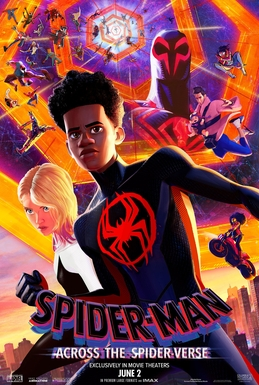
Spider-Man has always had a complicated history, even by comic book standards. Marvel has at several times run multiple Spider-Man comics series simultaneously, and due to the vagaries of the film industry, that has carried over into the movies. But rather than struggling with constant reboots like they did a decade ago, the movies have now embraced this, folding it into the larger Marvel Multiverse, where all of the stories are equally “real” and happening in parallel universes.
This multiverse has produced some surprisingly good films, this week’s offering of Spider-Man: Across the Spider-Verse is no exception. This sequel to the hugely popular Into the Spider-Verse from 2018 follows the continued adventures of both Miles Morales and Gwen Stacy, the Spider-People of Earth-1610 and Earth-65, respectively. And I will say now that this is a really good movie. Not quite as good as the first one (which I gave full marks), but it makes up for its minor shortcomings with its sheer epic-ness and its creative reimagining of the Spider-Man story.
My rating: 4.5 out of 5.
I’ll give my reasons for it below, but honestly, this a movie that you need to see in theaters completely fresh. As in, this is almost Avengers: Endgame levels of “you do not want to see the spoilers before going in.” That’s something everyone already knew about Endgame, but I feel almost as strongly about this one, so I’m asking you to trust my rating here, and if you haven’t seen Across the Spider-Verse yet, go see it!
MASSIVE Spoilers Below
Okay, are you back?
So, if you did go see the movie, you will know that we open on Gwen discovering that the chaos in the multiverse from the last movie hasn’t been truly solved—and also dealing with catastrophic family drama. Then, a mysterious interdimensional organization of Spider-People gets involved, whose mission is to protect the multiverse. And meanwhile, Miles faces a universe-hopping villain called the Spot while also struggling with major family drama and also discovering that his friendships (specifically with Gwen) perhaps aren’t as solid as he thought.
We’re then properly introduced to Miguel O’Hara, the no-nonsense, half-vampire Spider-Man of Earth-928 and leader of the Spider-People. He reveals that lingering damage from Kingpin’s particle collider mess is causing “anomalies” that threaten the multiverse. But that’s not the only thing that threatens the multiverse. It turns out that universes with a Spider-Person can be destabilized by disruptions to—and they actually use the word—the “canon.”
So, Spider-Man is one of the most rebooted superhero franchises in film (in theatrical film, at least). I think Batman has him beat, and he’s sort-of tied with Superman (long story) but he’s ahead of everyone else. And that means by now, everyone knows his story. He was bitten by a radioactive spider. His Uncle Ben died in a way that was indirectly his fault. He took up the mantle of “With great power comes great responsibility.” His arch-nemesis killed some more people he cared about—the whole nine yards.
There are endless version of Spider-Man in the multiverse, but every Spider-Man goes through the same things, and by now, it’s gotten kind of boring. That’s why the Tom Holland films skipped the origin story entirely (only to rehash it in No Way Home). That’s why No Way Home itself played with changing the ending of the characters’ stories (which might have detracted slightly from this movie, but not much).
But Across the Spider-Verse plays with the idea in ways I never imagined (at least, I never imagined would happen in an official release). Apparently, in the Spider-Verse, the canon is a law of nature, forcing the story to follow the narrative. And Miguel has everyone convinced that they have to (reluctantly) stand by and uphold it…until Miles questions it and asks if they can really call themselves the good guys if they don’t try to save everyone—because that’s what Spider-Man does.
And that was perhaps the biggest thing that made this movie so good. It’s a fresh take on the Spider-Man story that acknowledges (if implicitly) how the story has grown stale and manages to upend it and tell a riveting story around that meta-conflict, translated into the story itself. It’s an amazing bit of writing for that alone.
And like I said, it’s not perfect. I thought the first half was kind of unfocused and rambling—not a lot, but noticeable. But the second half had me on the edge of my seat, and when I finally realized what they were doing, the ending was so epic that they whole thing worked great.
I mean, honestly, when was the last time you saw a movie that wrote “To be continued” on the screen? Some, like Infinity War, Pirates of the Caribbean 2, or The Empire Strikes Back, implied it, but none of them came back in media res in the sequel—which Beyond the Spider-Verse seems poised to do. Far from Home No Way Home did, but it didn’t need to. The second Hobbit film did, but we already knew the story, there.
The other thing I loved about Across the Spider-Verse is that it has of the best examples of a non-twist-ending cliffhanger I’ve ever seen—one that’s not a surprise turn in the story itself, but simply cuts in at the most dramatic moment, out of the blue—one that you don’t see coming because it’s not a “Part 1” or a TV season ender, until you realize that you’re up against the movie’s runtime. I was genuinely surprised when I realized what they were doing, within a minute of the words flashing on the screen, and I think that means they played their hand perfectly.
(And that’s why I hope you really did see it fresh before reading this. If you didn’t, you have only yourself to blame.)
